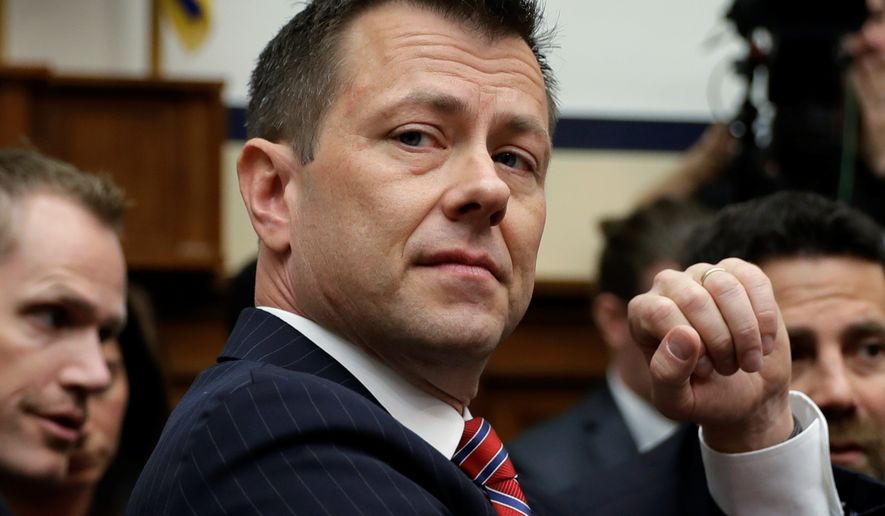Former FBI agent Peter Strzok, who headed the probe into President Trump and his campaign, is now distancing himself from the infamous dossier on which his team greatly relied.
In an interview with The Atlantic, the fired agent who famously texted he would “stop” a Trump presidency seemed to confirm Republicans’ complaints about the Democratic Party-financed dossier. Its creator, British ex-spy Christopher Steele, filled 17 memos with false felony allegations against the president and his allies.
“The Steele report was a problem for the investigation, because it sent people off on a series of wild goose chases,” Mr. Strzok told interviewer Anne Applebaum.
One example of a wild-goose chase: Mr. Steele asserted that campaign chairman Paul Manafort and volunteer Carter Page conspired with the Kremlin to interfere in the 2016 election. In fact, the two men did not know or speak with each other.
Mr. Steele said Trump attorney Michael Cohen secretly traveled to Prague to meet with aides of Russian President Vladimir Putin and provided cash to cover up the campaign’s role in computer hacking. The FBI found the claim to be one of those “wild goose chases.” It concluded such a trip never happened.
Mr. Strzok repudiated the dossier with this assessment: “The report was very typical of information that the FBI often receives. It comes from several sources, including some suspect sources. Some of it is b———-, and some of it is rumor, and some of it is disinformation.”
The former FBI agent, who was kicked off the special counsel’s team in 2017 for his texted anti-Trump tirades, bemoaned to The Atlantic how critics had used the dossier to sully the bureau.
“So some people have sought to use the weaknesses of the Steele reporting to try and cast aspersions against the entirety of the FBI’s massive investigation,” Mr. Strzok said. “These efforts have been very disingenuous, very distorting, and very successful.”
Mr. Strzok is still targeting Mr. Trump. His memoir, “Compromised: Counterintelligence and the Threat of Donald J. Trump” is to be published Tuesday.
He is the third high-ranking FBI official to write a Trump-deriding book, following two other fired FBI officials — Director James B. Comey and Deputy Director Andrew McCabe.
Mr. Strzok told “CBS Sunday Morning” that FBI mistakes in the Trump investigation were “inexcusable” but resulted from an overworked staff.
“I don’t think at all that it’s anything improper,” Mr. Strzok said. “You get people who are overworked, who make mistakes — and don’t get me wrong, inexcusable mistakes.”
Justice Department Inspector General Michael E. Horowitz found great fault in the FBI’s reliance on Mr. Steele to obtain four wiretap warrants lasting a year on Mr. Page. Without the dossier, there was not sufficient evidence to go before a federal judge, the IG reported.
The FBI misled Foreign Intelligence Surveillance Act (FISA) judges 17 times by providing either incorrect information or withholding critical evidence. For example, Mr. Page told FBI informant Stefan Halper that he had never spoken to Manafort. Mr. Strzok’s team knew this but never told FISA judges, who only had Mr. Steele’s false narrative.
Mr. Steele’s main source, Russian national Igor Danchenko, was located by the FBI. He told agents that his flow of information was “just talk” and not worth a “grain of salt.” Again, the FBI did not relay this to judges.
Besides wiretaps, here are other ways Mr. Strzok and higher-ups embraced the unverified dossier:
• Mr. Comey took the material to President-elect Trump and to President Obama.
• The FBI accepted a steady flow of dossier memos from the Democratic Party opposition research firm Fusion GPS, through a Justice Department intermediary.
• Agents used dossier allegations to target Trump allies.
• The FBI agreed to pay Mr. Steele to continue probing Mr. Trump in an October 2016 meeting in Rome, even though they had yet to confirm any of his investigation.
• Mr. Comey insisted that the CIA include the dossier in its official history of Russian election intervention. The CIA refused, calling it “internet rumor.” As a compromise, agencies made it an appendix in the January 2017 Intelligence Community Assessment that contained the most stunning claims about Mr. Trump, all of which proved false.
Special counsel Robert Mueller’s final report said he did not establish that there was a conspiracy between Moscow and the Trump team.
The Atlantic’s Ms. Applebaum complained during the interview that Mr. Mueller did not investigate all of Mr. Trump’s ties to Russia.
However, it is unclear from the Mueller report whether the special counsel did or did not. An international businessman, Mr. Trump had visited Russia three times and briefly discussed building a Trump Tower in Moscow in 2015 and early 2016. To date, the Trump Organization has yet to build anything in Russia. Cohen testified to Congress that he knows of no Russian money coming to the Trump Organization.
Mr. Strzok remains unapologetic for his actions. He filed a lawsuit in U.S. District Court against Attorney General William Barr, arguing that he was wrongly dismissed.
The Justice Department filed in court a copy of a “personal” August 2018 letter to Mr. Strzok disclosing that the FBI Office of Professional Responsibility had issued findings against him. It included: “made inappropriate political comments in text messages on your FBI-issued cell phone” and “failed to diligently pursue a significant investigative lead,” which amounted to “dereliction of supervisory responsibility.” (This came in the Hillary Clinton email probe, which he also headed.)
The hearing officer recommended that Mr. Strzok be demoted and suspended 60 days. The FBI deputy director opted to fire him.
• Rowan Scarborough can be reached at rscarborough@washingtontimes.com.




Please read our comment policy before commenting.